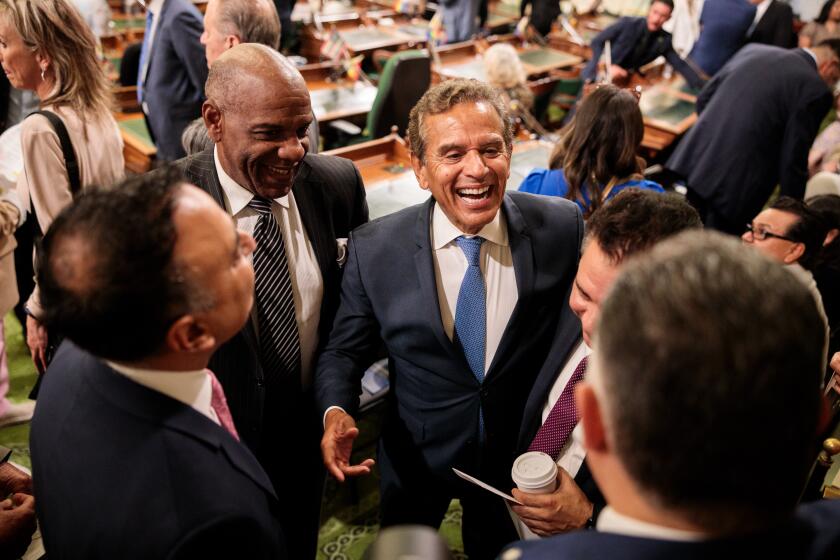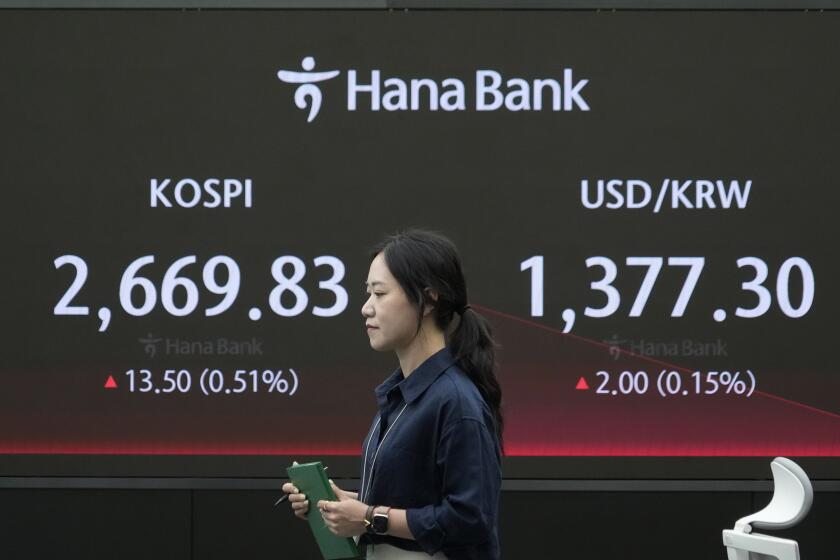Bank bonuses are in Fed’s cross hairs
Escalating the government’s intervention in corporate pay practices, the Federal Reserve moved Thursday to restrict the ability of thousands of banks to pay bonuses in an effort to curb risky practices widely cited for helping to trigger the global financial crisis.
Under its proposal, the Fed would examine the compensation of any bank employees -- including senior executives, securities traders and loan officers -- who individually or collectively could significantly increase the amount of risk taken on by their employer. The central bank could order changes to policies that encourage too much risk.
The Fed’s action came as the Obama administration’s “pay czar,” as expected, took the unprecedented step of dictating changes to the pay packages of the highest-paid employees at the seven companies that received the most federal bailout money.
The dual steps taken Thursday came amid an unrelenting public outcry about the scale of pay on Wall Street in the wake of the financial crisis. Some experts predicted the actions could provide momentum for changes in corporate compensation beyond the companies directly affected.
“The debate over CEO pay fundamentally shifted last year when it became not just shareholders getting ripped off, but also taxpayers getting ripped off,” said Dan Pedrotty, director of investments at the AFL-CIO and a critic of high executive pay. “I think the outrage over all of these economic collapses is going to fuel reform.”
The Fed’s action could have a far-reaching effect on Wall Street, said Patrick McGurn, special counsel at RiskMetrics Group, a New York advisor to large investors about how companies are governed.
“It might stop a lot of the free-agency mentality that has played out in the financial services industry, where someone would look for a quick kill and then jump to another firm and let the house of cards come crashing down behind them,” he said.
The Fed’s proposal would apply to the nearly 6,000 banks it regulates. The 28 largest of those institutions -- almost certainly including Citigroup, Bank of America, Wells Fargo, JPMorgan Chase and Goldman Sachs Group -- would receive extra scrutiny.
The Fed would not dictate salary or bonuses for bank employees but instead would take compensation policies into account as part of its routine determination of whether the firms were being soundly run. Regulators would look in particular for incentives that encourage undue risk.
As an example of such incentives, a senior Fed official pointed to bonuses that are based on the volume of loans made by an employee or the amount of trading revenue generated without taking into account the riskiness of the loans or trades.
The central bank issued very general guidance Thursday on how pay arrangements should be structured and asked for public comment on the proposals for the next 30 days.
But it said banks shouldn’t wait for the final guidance but should “immediately” launch their own reviews and alter pay arrangements that could threaten bank safety.
Also Thursday, Kenneth Feinberg, the Treasury Department’s special master for executive compensation under the $700-billion Troubled Asset Relief Program, announced his decision to cut by more than half the average total compensation for top employees at the seven biggest recipients of TARP money -- Bank of America, Citigroup, American International Group, General Motors, Chrysler and the automakers’ financing units.
The cuts, which apply to as many as 25 employees at each company and take effect Nov. 1, will reduce their total compensation an average of 50% and their cash pay an average of 90%.
The changes boost the proportion of compensation paid in company stock, but executives generally have to wait years -- or until the employer has repaid its TARP money -- before selling those shares. The restrictions are designed to limit conduct by the executives that would harm the value of their companies’ stock.
Feinberg said he tried to balance the public anger over salaries at those firms with the need to keep too much top talent from fleeing.
“The taxpayers are in deep with these seven companies,” he said, “and one of my primary obligations is to see to it that the taxpayers’ dollars are returned to the U.S. Treasury.”
At the White House, President Obama praised Feinberg’s work.
“This is America. We don’t disparage wealth. We don’t begrudge anybody for doing well. We believe in success,” Obama said. “But it does offend our values when executives of big financial firms -- firms that are struggling -- pay themselves huge bonuses, even as they continue to rely on taxpayer assistance to stay afloat.”
Several of the companies under Feinberg’s watch, though they didn’t criticize his orders, said their compensation plans already were heavily weighted toward long-term, stock-based compensation.
But Bank of America issued a statement complaining about “an inability to pay people based on their performance and value,” suggesting the pay cuts could prompt some executives to leave the company.
“Competitors not subject to the pay restrictions are already exploiting this situation,” the bank said.
Feinberg encouraged other companies to follow his lead voluntarily and structure pay to reduce risk-taking.
“I personally believe that it’s a lost opportunity for a broader marketplace not to take advantage of what we’ve learned in this process,” he said, but he pointed out that his jurisdiction “begins and ends with these seven companies.”
Congress is considering “say on pay” legislation that would give shareholders in all public companies an advisory vote on executive pay packages. Some compensation watchdogs say the measure wouldn’t have much effect and are pushing for more direct measures, such as giving shareholders more control over corporate boards.
Such moves could help realign pay scales at U.S. companies.
In 2007, U.S. chief executives were paid on average 275 times the average compensation of the workers at their companies, compared with 24 times in 1965, according to the Economic Policy Institute.
The ratio currently is also much higher in the U.S. than in other countries, other studies have found.
But McGurn said a general lowering of the pay scale for U.S. executives was unlikely.
“It may slow the rate of growth,” he said, “but one constant in the universe is that you never see executive pay go down.”
--
martin.zimmerman@latimes.com
Times staff writer Walter Hamilton in New York contributed to this report.







